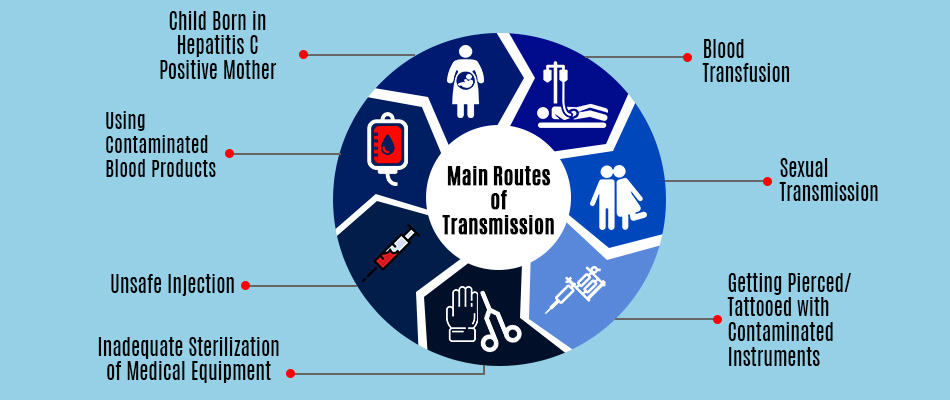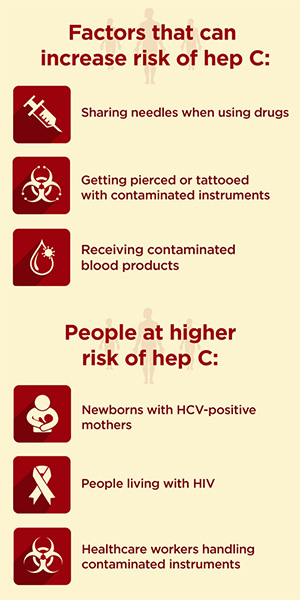Hepatitis C is a blood-borne infectious disease which spreads when exposed to contagious blood samples. Thus proper care must be taken to prevent spreading of this disease and keeping yourself at bay from the infection.
 Routes Of Transmission Of The Virus
Routes Of Transmission Of The Virus
Hepatitis C follows the following routes for its transfer to a host body. So one must be careful while dealing with the virus and stay isolated from its contamination. The various routes are:
- Parenteral route, especially via a blood transfusion received before 1992
- Intravenous and unsafe drug use through syringes
- Hemodialysis
- Sexual contact with an affected individual (though the transmission rate is quite low) but the rate increases when an individual is also affected by HIV
- Needle-stick injuries in healthcare settings due to improper sterilization of medical products
- Transmission of virus from an infected mother
Risk Factors And How To Stay Safe
 There are quite some risk factors associated with the spread of the disease amounting but not limited to the following:
There are quite some risk factors associated with the spread of the disease amounting but not limited to the following:
- Drug misuse via unsterile injections or blood-contaminated syringes, therefore one should avoid them at all costs
- Unscreened blood transfusions; thus one should only take blood from a registered blood bank
- Mother to baby transfusion during pregnancy which is at about 6%. The case worsens when collaborated with a co-infection of HIV to about 14-17%, but is absent In case of breastfeeding
- Refrain from having unprotected Sexual intercourse with partners affected with HCV
- Health workers working in unsafe and unsterile environments
- Tattooing from unauthorized stores using contaminated instruments
- Sharing razors and toothbrushes which might be contaminated with blood
There are also a few factors to be taken care of which are associated with the rapid progression of the liver disease:
- Being over 40 years old when your immunity is not that strong
- Regular alcohol consumption
- Male
- Regular smoking
- Previous co-infection with HIV or Hepatitis B
- Immunosuppressive therapies which drastically lowers down the body defense mechanisms.
Assessing The Severity Of The Infection
If the virus is found to be present inside the body of an individual, it is advisable to carry out other tests the check the inflammations or damage to the liver. Some of the recommended tests for accessing the severity of the infection are:
- Blood tests also called liver function tests should be conducted. These tests are done to measure the activity of chemical substances or enzyme s and other substances made in the liver. From the measurement of these parameters, we get to know as to whether the liver is inflamed or is working within limits.
- Ultrasound scan of the liver to predict if any abnormal growth is there in the liver
- Other tests to check cirrhosis and other complications that might develop due to this disease
- Specialized blood tests to assess the severity of cirrhosis and to monitor its development
- Liver biopsy, following which a small sample of liver is taken to be carefully examined under the microscope to check for ensuing infections.
How To Prevent The Virus From Passing On?
If someone is infected with the Hepatitis C virus, the following steps should be followed to keep the spread in check:
- Do not share any injecting equipment such as needles and syringes
- Do not donate blood or even carry a donating card
- Do not share anything that is or may be possibly contaminated with blood like a toothbrush or a razor
- Practice safe sex by the use of condoms (though the rate at which the virus is transmitted through sex is small, still it is advisable to maintain distance for your safety)


